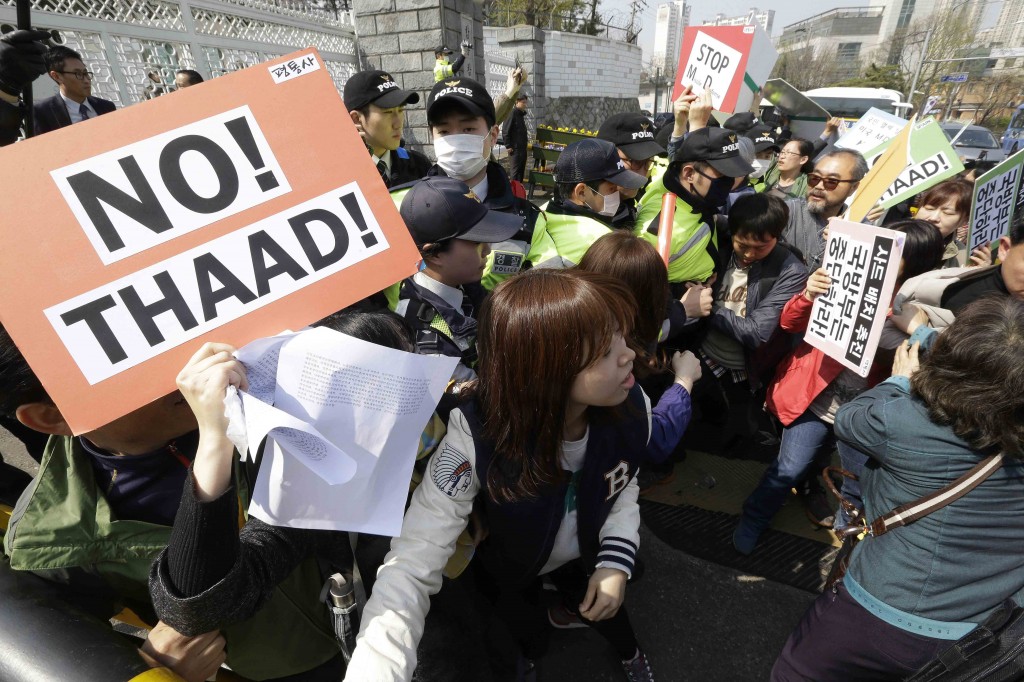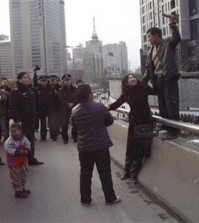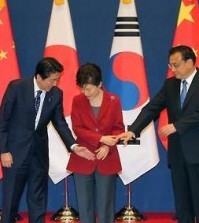- California Assembly OKs highest minimum wage in nation
- S. Korea unveils first graphic cigarette warnings
- US joins with South Korea, Japan in bid to deter North Korea
- LPGA golfer Chun In-gee finally back in action
- S. Korea won’t be top seed in final World Cup qualification round
- US men’s soccer misses 2nd straight Olympics
- US back on track in qualifying with 4-0 win over Guatemala
- High-intensity workout injuries spawn cottage industry
- CDC expands range of Zika mosquitoes into parts of Northeast
- Who knew? ‘The Walking Dead’ is helping families connect
Chinese media warns against US missile-defense system in Korea

Protesters struggle with police officers as they march toward the Defense Ministry during a rally against the visit by U.S. Defense Secretary Ash Carter in Seoul, South Korea, Friday, April 10, 2015. Protesters opposed a possible deployment of a Terminal High-Altitude Area Defense (THAAD) system on Korea Peninsula. (AP Photo/Ahn Young-joon)
BEIJING, April 10 (Yonhap) — A Chinese state-run newspaper warned Friday that bilateral ties between Seoul and Beijing would be “shattered” if an advanced U.S. missile-defense system is deployed in South Korea.
The Global Times made the comments in an editorial on the day when U.S. Defense Secretary Ashton Carter was in South Korea, a visit that is aimed at bolstering America’s diplomatic and military rebalancing to Asia.
In Seoul, Carter told reporters that the U.S. is not yet ready to discuss with South Korea the possible deployment of the Terminal High-Altitude Area Defense (THAAD) system.
“Both the U.S. and South Korea claim the installation of the defense system is aimed at containing North Korea, not China,” said an editorial in the paper published by the ruling Communist Party.
“However, this is viewed as ‘words to beguile kids’ by almost every Chinese military analyst. One thing is for certain — the Chinese public’s accumulating goodwill toward Seoul would be severely battered if THAAD finally lands in South Korea, and the foundation of the bilateral ties would be shattered,” it said.
China’s concerns over the possible deployment of the THAAD battery have been known, but the language used by the newspaper took a more caustic tone.
To better cope with the growing threats of North Korea’s nuclear and missile capabilities, both South Korean and U.S. officials have indicated the need for the THAAD battery.
Arguing that the U.S. missile-defense system also targets China, Beijing has publicly pressed Seoul not to accept the THAAD battery. In return, South Korea’s defense ministry has blamed China for trying to “influence” Seoul’s security policy.
South Korea and the U.S. have called for China, the economic lifeline of North Korea, to do more in reining in North Korea’s nuclear and missile programs, but China’s stance over its ideological ally, Pyongyang, has often been self-contradictory.
Many analysts believe that China’s Communist Party leadership won’t put enough pressure on North Korea to give up its nuclear ambitions because a sudden collapse of the North’s regime could threaten China’s own security interests.

















kelly
November 24, 2017 at 10:55 AM
Very nice and always successful.
This is a very good article.
I’m waiting for you the other article.
togel online